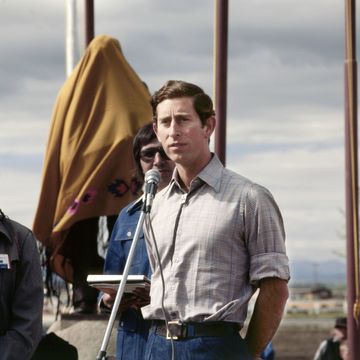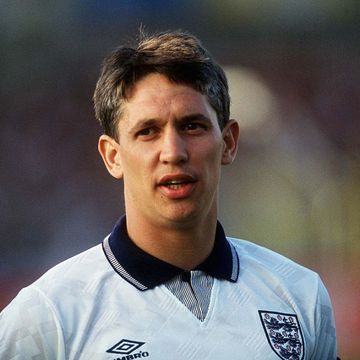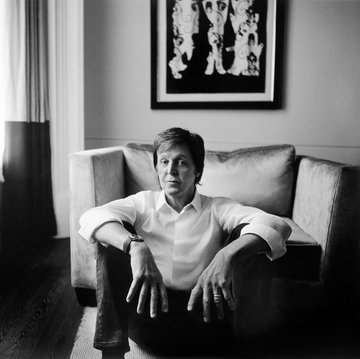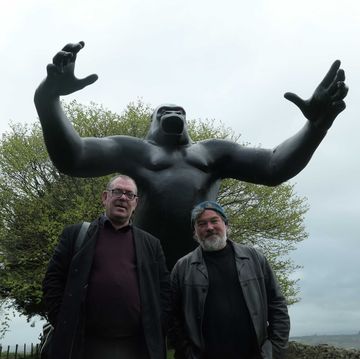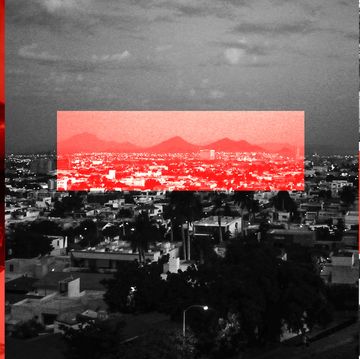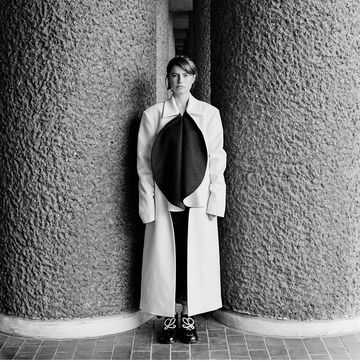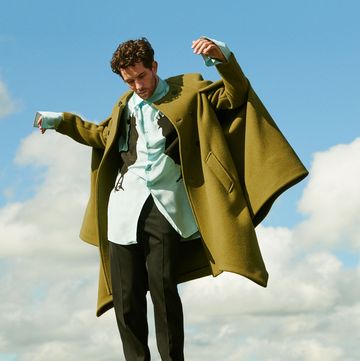After travelling through the mountains of Northern Iraq in the back of a HiLux pick-up truck, a young Scottish man from Dundee waited with Kurdish guerrillas for a night with no moon. They needed complete darkness to avoid being spotted as they smuggled themselves across the border into Syria. Knelt down in the dirt on the bank of the Tigris River, they watched silently as armed patrol boats cruised past into the night. It was the spring of 2016, and the start of the fifth year of the Syrian Civil War. The young Scotsman, an unemployed 27-year-old named Callum Ross, had travelled 3000 miles from a council estate in Edinburgh to be there.
When the coast was clear, the guerrillas scrambled down the riverbank and inflated a rubber dinghy in the water. Nervous but excited, Callum leapt in. He sailed slowly into the darkness. A few tense minutes passed. The patrol boat could be heard in the distance. What if it spotted him? What if they open fire?
Finally, the dinghy reached the other side of the Tigris. A second unit of guerrillas were waiting for Callum in the field next to the river. This was his last chance to turn back. Either go home to his flat in Scotland, or be escorted to a training camp in Syria. The young Scotsman, covered head to toe in tattoos with a rough ginger beard, had already made up his mind.
He got out of the dingy and pushed it back across the river. Within a month, he'd be on the frontlines in Syria with an assault rifle in his hands. Callum Ross had come to fight the Islamic State.
While reports of the 5000 or so peoplewho have left Europe to fight for ISIS have caused countless headlines and much soul-searching in Britain over recent years, the hundreds of volunteers who have gone to fight against them have received less attention. Callum Ross, one of those volunteers, stayed out there longer than most.
One night, as he manned a point at the frontline just 30 miles from Raqqa city—the former capital and stronghold of the Islamic State's self-declared caliphate—he joked to me on the phone that the standard of food was about as good as it is in Scotland. He'd just eaten a dinner of "knock-off Dairy Lea triangles and pasta" before holing up for a nightshift behind some sandbags on the roof of an abandoned house. He didn't seem to take himself too seriously, and for a man with no body armour, helmet or boots he seemed surprisingly happy to be on the frontline.
Earlier this year, after 12 months at war, Callum returned to Edinburgh where I travelled to spend a weekend with him, hoping to find out how a young man goes from the dole queue in Scotland to the frontline in Syria.
"I always wanted to go to war," he said, dragging on a roll-up as we sat in a high-rise council block. "But I'm not gonna go fight for some Queen, or fight for the fucking Tories. I fought for something that makes sense to me."
In Syria, the foreign volunteers join the People's Protection Units (YPG)—a Kurdish militia that's been fighting to carve out a state for itself (known as Rojava) in Northern Syria since the start of the war in 2011.
The mountainous areas between Iraq and Syria are controlled by the YPG's counterpart, the Kurdistan Worker's Party (PKK). The PKK fights mostly in Turkey, fighting the Turkish state for Kurdish rights, in what they believe is North Kurdistan (current day southeast Turkey). The PKK has been fighting since 1984, in a conflict that's claimed more than 40,000 lives. It's listed as a terrorist organisation by Europe and America.
The PKK officially states that the YPG is not its Syrian wing. Any fighter on the ground though, might tell you something quite different. But with this narrative, the YPG can receive help from the West, and the West can have a strong ally in Syria.
Both the YPG and the PKK have the same figurehead leader (imprisoned Abdullah Öcalan), the same ideology, and sometimes the same fighters, depending which side of the border they're on. But if anyone asks, they're not the same. Thus is the madness of the Syrian war.
With the help of US airstrikes and heavy weaponry, the YPG has proven to be one of the most effective forces battling ISIS. Whilst creating a homeland for themselves in Rojava, the YPG has drawn the attention of leftists all over the world due to their proclaimed ideals. The YPG, despite facing criticism that it's authoritarian, says it fights for equality and anti-fascism. It's a message that made sense to Callum.
"I fucking hate the ISIS ideology, to me it's the same as Nazism," he said. "One hundred per cent that was my motivation for going to Syria—to fight fascism.'
Having been involved in far-left movements for years, Callum says he witnessed the rise of identity politics in Europe and wanted nothing to do with it. He told me he thought left wing politics in Europe was "shite", calling the G20 rioters "weekend warriors" and laughed at how the far-left has become preoccupied with "being offended". He saw himself as a true working class revolutionary, "like it used to be".
Callum grew up hearing stories about how it used to be. His dad would often tell him about the 1936 – 1939 Spanish Civil War, where thousands of workers from across Europe voluntarily went to fight in Spain against the military dictator Francisco Franco. His dad told him about how some of his grandfather's friends had even gone to fight. From a young age, they were Callum's heroes.
"There's a long history of Scots going over to fight against Franco," Callum said. "Even in my city there's a [commemorative] plaque with the names of the volunteers who went. To me, growing up, I always heard a lot of stories about them. They're unsung heroes."
Hearing the stories of working class men and women who died fighting Facism in Spain left a deep impression on a young Callum. As he grew older, his politics were built on these volunteer fighter stories and the poverty he was surrounded by. Eventually, Callum involved himself with the Antifa scene, scrapping with the far-right on the streets of Scotland.
"[There was] plenty of fist fighting," he laughed. "Bottles, knives… I'm Scottish."
Callum shrugged and grinned.
As he went to protests throughout his early 20s, propaganda videos of YPG foreign volunteers started spreading on Facebook in 2014. When he saw them, Callum immediately drew a comparison between those volunteers and the ones he'd idolised as a kid.
"I likened the two struggles," he nodded. "They're different wars, but fighting the same ideas."
A fire was kindling now inside Callum. Apart from the occasional scrap with a fascist, he felt there was no meaning to his life. The more footage of the YPG fighters he watched, the more protests in Europe seemed inconsequential. It became obvious to Callum: his fight was in Syria, not Scotland.
Before the night he crossed the Tigris River, Callum was in a training camp on the outskirts of Norther Iraq. After being met at the airport, he was driven for hours through the mountains before stepping out into a scene unlike anything he'd ever experienced. By the flickering light of a fire, he saw guns propped up against rocks and hardened PKK guerrillas dressed in their traditional baggy fatigues. There was a small stream near by that people drank from. Fighters from all over the world welcomed him.
"That was amazing. Amazing man!" he said. "It was such a beautiful place. I remember looking out over everything, drinking chai and just chatting to people from all over the world who were just coming and leaving [Syria]."
Despite this, he says he felt a first twitch of cold feet as he saw the other foreign fighters trudge back into the camp. The war had taken its toll on these young men and women.
"I remember thinking 'wow you guys look fucked up' you know? You could just see the war in them. I thought 'fuck that's going to be me'. It scared me a little bit. But then I thought 'oh well, we're here now.'"
In the next four weeks he'd take a crash course in the Kurdish Kurmanji language, as well as briefly being shown how to shoot rifles and throw grenades.
"[In training] you do a very small amount of shooting guns," Callum laughed. "I fired nine rounds with a Kalashnikov, three rounds with a Bixi [a BKC gun], three rounds with a Dragunov [a Soviet sniper rifle], and we threw stones instead of grenades to learn. That's the basic Rojava military education."
When Callum's training was complete, he was given his own Kalashnikov and a Kurdish name. Callum Ross became Rizgar Dêrik. His identity as a fighter was born. Soon, it would be tested – 'Rizgar' was sent straight to the frontline, where he would face 'the famous night war'.
Callum joined a small unit under the YPG made up entirely of foreign volunteers dubbed the 'International Freedom Battalion' (IFB), a mix of hard-core communists and anarchists from all over the world. The shades of red vary, and there are many sub-factions within the IFB, but one thing the fighters are united in is their hate for ISIS. For Callum, the IFB would become his new family.
One night at a makeshift frontline base near the town of Suluk, just 50 miles north of Raqqa, Callum and a French volunteer were making a cup of tea for their Iranian friend on guard duty. The "base" was just a few crumbling stucco buildings and a water tower. At that time, heavy fighting had left Suluk a ghost town. Around a dozen IFB were manning the base to ensure ISIS fighters didn't move in to retake any ground, in the YPG's now accomplished push to liberate Raqqa.
Usually three people would man the water tower with night vision goggles and thermal scopes. That night though, it was empty. Earlier some Kurdish YPG had come to take the group's equipment to use at their own position down the road, and without it, there was no point blindly manning the tower. Instead, Callum and his unit were on the flat roof of a building, where they slept surrounded by sandbags and weapons.
As Callum boiled up a hot cup of sugary chai tea, the Iranian shouted suddenly. He'd seen someone on the dirt berm just 15 feet away from the base. Callum bolted for his Kalashnikov—the threat of an ISIS suicide bomber sneaking up on them was high. Everyone leapt into their positions on the roof as they tried to see the enemy.
"Someone shouts 'there!' Pap-pap-pap. We all start fucking firing. I'm at the end of one corner of the roof behind a load of sandbags, and I had an RPG [rocket propelled grenade]. Never fired an RPG before, but I'd been given the job as RPG guy." Callum laughed. "That was my job. So I'm in my wee position and I've got an RPG, my Kalash, and I was like 'right, fuck, this is it!'"
His adrenaline pumped. His heart raced. It was his first battle. The Scotsman was a long way from home. Callum knelt down behind the sandbags with his rifle, chambered a round, raised his head, had a look, raised the gun, took one shot, took another— then: "Jammed! My fucking gun jammed!" Callum burst out laughing as he told me the story.
Luckily he'd slept next to a Serbian at the training camp who claimed to have once fought in the French Foreign Legion. The Serb had shown Callum how to speed assemble a rifle blindfolded every morning. In roughly a minute, Callum had dislodged the jammed round from his weapon and was back shooting into the blackness. Then, suddenly, as he fired one way, two bullets whizzed right past his head from the other.
"Out of the corner of my eye I saw the muzzle flashes coming from the water tower that we'd left empty behind us."
Callum shouted for his team commander, summoning him over to his position. The French commander scrambled to cover with the Scotsman. Callum explained that ISIS had snuck past them into the water tower.
"In this strong French accent, he just goes 'oh shit! If they are in the tower, we are really fucked now!'" Callum recalls.
The foreign volunteers were helpless. They hugged the ground and waited. After a minute or so, the sound of constant outgoing gunfire was broken by the static of the radios across the roof. Slowly the guns stopped firing and everybody stood up. Callum and the Frenchman, stretched out on their stomachs still, looked at each other puzzled.
Kurdish could be heard crackling from the radios. "The [YPG fighters nearby] called to asked us: 'What are you guys shooting at?' and we're like 'we dunno, you guys have got the night vision… what are you shooting at?' They never answered that question." Callum grinned. Turns out the YPG sniper unit down the road had heard the commotion and quietly ran to the foreigner's base to help. They shimmied up the water tower and took aim.
"That worried me a bit, because they were in the tower with thermal vision, shooting at me. In that moment everybody got confused. So there was nobody there. There was no ISIS. We were shooting at nothing. So that became the 'Famous Night War.'"
The event became a standing joke among the group, but privately Callum was forced to reflect on the fact his life had almost ended in friendly fire. The false alarm turned out to be merely a taste of what was to come.
Plenty of people would claim to feel as passionately as Callum about opposing ISIS and fascism, but very few would board a plane to risk their lives for it. In Edinburgh, I tried to get him to explain what made him different.
Callum looked out the window at the other grey columns of flats that made up his estate. They were like giant tombstones. They stood there across the green staring back at him.
"People are ruined out here," he said solemnly. "You have to shoplift to fucking live."
Whilst unemployment in Scotland isn't that much higher than in England, rates vary massively in different areas. In Dundee for example, where Ross grew up, youth unemployment is at a rate of 19.4%. The national average in Scotland is 14.3%. Some poor areas are noticeably poorer than others, something Callum knows all about.
Struggling to find full-time employment, he'd do labouring here and there while signing on for benefits, living on about £300 a month. With no work, no real excitement, no future, Ross spent his time smoking too much weed and getting tattooed by his mates. His arms are a tapestry of inked gypsy girls, "Mum and Dad" love hearts, and a creepy plague doctor. A baseball cap stays permanently attached to his head. As we walked through the estate, there was a quiet confidence to Callum. He doesn't seem one to get accosted. He's tall, broad, and as he put it, looks like "a right dodgy geezer".
Callum grew up around "crazies and junkies" in Dundee, before wasting away on the housing estates of Edinburgh. "There's an actual sense of community in these places," he shrugged. "I prefer it [to the more affluent areas]."
Nevertheless, he said, he felt he had "fuck all to live for" in Scotland and, after researching Kurdistan for three years, took the plunge and arranged his travel to Syria via various, now defunct Facebook groups ran by the YPG.
"The night before I left I was sitting exactly where we are in this flat," he said. "I was with all my mates. We ate food, had some beers, got stoned, had a laugh..."
After the going away party, Callum gave a key to one of his friends. "I asked her to take some sentimental stuff out of my house that I wanted to keep for if I made it home. That was my mind-set: 'I'm never coming back here' … I was scared, but I was so focused on Rojava, in my mind it was like I was already there."
He put some clothes in an old tattered rucksack he'd had since he was 13-years-old. It had been a gift from his mum. He still had it. In the lining "CALLUM ROSS" was scrawled in permanent marker. He packed two pairs of underwear, two pairs of socks, two t-shirts, a hoodie, and a book—a copy of Orhan Pamuk's Snow. He left everything else behind.
The "Famous Night War" would be Callum's first and last taste of accidental combat. In the following months he snuck behind ISIS lines to lay bombs on the roads, helped to fight around Mount Sinjar in Iraq, and even witnessed the West's helping hand in action when an American A-10 Warthog fighter jet strafed ISIS positions.
Callum described how YPG commanders would radio them at random and give just an hour notice before they had to embark on a mission. Despite the high risk of getting captured and beheaded, or burned alive, or drowned, or shot by a child, or thrown off a building, or any of the other horrific executions ISIS fighters have filmed themselves carrying out, the foreign volunteers never questioned these snap operations.
"You just say 'yeah okay.'" Callum shrugged. "Then you just walk [into ISIS territory]. You leave your front and walk to their front. One time, when some comrades came to pick me up, the back of the car was piled up with all sorts of material for making bombs. Both of the comrades turned round at the same time and said 'no smoking!'" Callum laughed. "I was like: 'yeah, no worries mate.'"
The day he witnessed an America fighter jet was the first time Callum prayed at war. He's not religious, but as the red streaks of tracer rounds flew past his head for hours, he got desperate.
"That was scary," he said. "I prayed a lot. Just in those moments I was like 'god will you just fucking sort me out?'"
Callum and other IFB fighters had been guarding a deserted village 50km from Raqqa. It had been empty for weeks. Then, one day at two o'clock in the morning, the silence was shattered as the call of "Allahu Akbar!" echoed across the village from the mosque's loudspeaker. It was an ISIS Imam. The jihadists had gotten back into the village. They were coming.
Almost immediately, Callum found himself diving for cover behind oil drums full of sand. ISIS was attacking from three different directions, pumping tracer fire at him and the other fighters.
"I just started shooting at ISIS from there. For hours," he said. "It was the most intense battle I was involved in."
The fighting continued all night until coalition warplanes flew over. "When the sunrise came … the A10 arrived. When that shit comes, it's like a demon. The noise it makes… it's like Satan has just flown past spitting out death."
Callum's prayers had been answered. The battle ended with the corpses of ISIS fighters spread out all around his position. It was a sight he'd grow accustomed to in the months he had left.
In the end, it wasn't the horrors of war that convinced Callum to leave Syria. Instead, he says, it was the new foreign volunteers who joined them from the West that broke his spirit. After a year he'd learned Kurdish so well that he was often asked to translate between them and the Kurds.
"Toward the end I was having to deal with a lot of the other volunteer's problems," Callum sighed. "That got me tired. I hated being with a lot of the other internationals. I've got no time for someone who comes to join the sixth year of the Syrian war to complain that things aren't good. What the fuck were you expecting?"
When Callum arrived back in Scotland, he was picked up at the airport by special police dressed in suits. They asked to see his passport, and escorted him into a side office.
"We went into a room and I said 'I'm not answering anything until I get an IrnBru'. They laughed, and I just looked at them. They were like 'ah he's fucking being serious', so they got some guy to go to Marks and Spencers to get me an IrnBru on police expenses. I sat there with me IrnBru and they questioned me for a few hours. Then they let me go."
Shortly after he returned, Callum learned that several of the people he'd come to call friends had been killed back in Syria. I asked if he thought he'd perhaps come home at the right moment. "I dunno," he shrugged. "I dunno."
For the first time, Callum seemed glum. He walked into the kitchen to light another roll-up using the toaster. He'd no lighter. When he walked back in he stared out the window for minute. It was dark now.
"I'm now back in the flat I was in the night before I left," he said. "It feels weird. It feels strange … [Fighting in Syria] changed my life. I found purpose, a reason to live… Nothing's changed here, you know? You can just come back here and slot directly back into what you were doing, which I don't want to do. I wanna fucking do something with myself."
As he said this, the pop, pop, pop of fireworks sounded from somewhere outside. Straight away, Callum was on his feet and by the window. "Incoming!" he shouted. "Pap, pap". Then he looked back at me, imaginary rifle still at his shoulder, and laughed.




